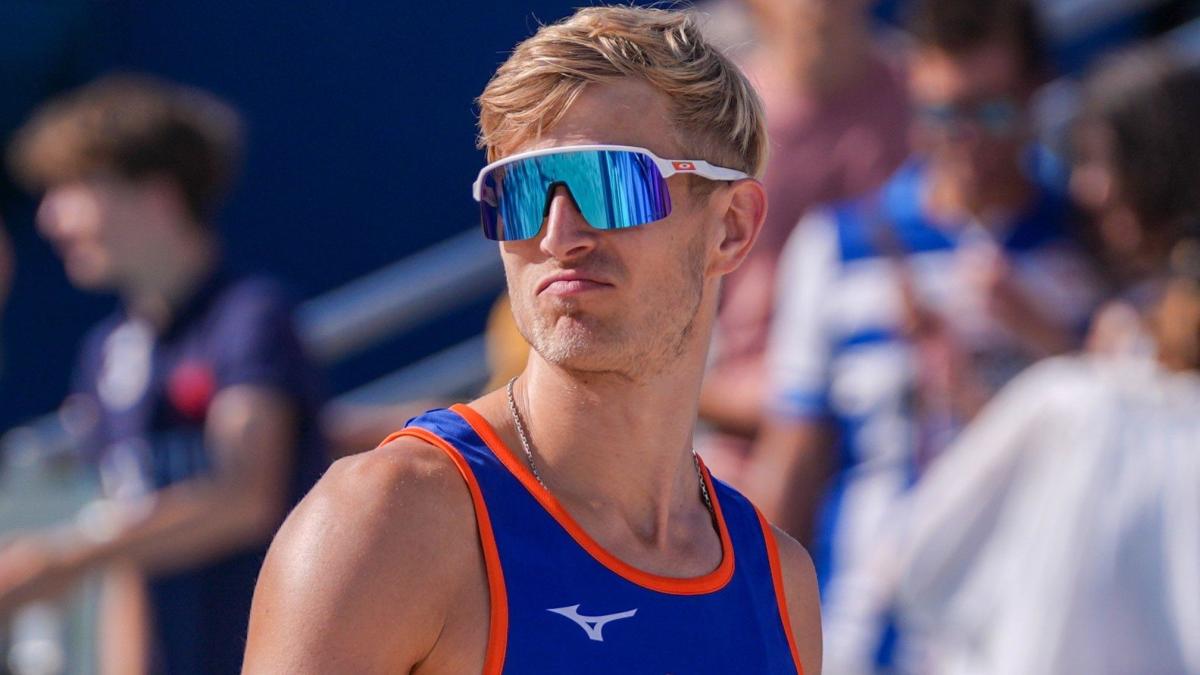Sports
Convicted rapist Van de Velde booed on Olympic debut

Convicted child rapist Steven van de Velde made his Olympic beach volleyball debut to a mixed reaction in Paris, with audible boos.
Van de Velde was sentenced to four years in prison in 2016 after admitting three counts of rape against a 12-year-old British girl.
He and partner Matthew Immers are ranked 10th in the world but lost 2-1 to Italy’s Alex Ranghieri and Adrian Carambula, ranked 25th, at the Eiffel Tower Stadium.
The pair were introduced to the crowd together, with cheers as well as some boos as they walked out.
There were boos, along with applause, when Van de Velde was individually announced to the crowd before the match began.
All players shook hands before and after the match.
The Dutch pair are next in action on 31 July, when they face Chile’s Marco and Esteban Grimalt at 15:00 BST.

An online petition calling for 29-year-old Van de Velde to be banned from the Olympics had received 90,000 signatures before he played his first match.
His inclusion in the Dutch team has been criticised by women’s and safeguarding groups.
Fans speaking to BBC Sport before the match also felt he should not be competing.
One British fan said: “He’s been open and honest about it and he’s served his time, but personally, I think they could have made a different choice.
“They could have chosen someone else, avoided all the controversy and if it was a British person, I wouldn’t be happy they would be in our team.”
Another said that Van de Velde’s inclusion “does not represent the spirt of the Olympics”, while one German fan, when told by BBC Sport about the story, said: “I am very astonished. He should not be allowed to play.”
However, one Dutch fan said it was “right” Van de Velde was competing, adding: “He’s been punished and now it’s over and he can continue with his life like anyone else.”
Van de Velde is not staying in the Olympic village and will not do any post-match media.
There was extra security around him when he arrived in Paris with the rest of the team.
In previous interviews with Dutch media, Van de Velde said: “I can’t reverse it, so I will have to bear the consequences. It has been the biggest mistake of my life.”
Why is Van de Velde allowed to compete?
The International Olympic Committee (IOC) has said the selection of athletes for the Games was the responsibility of individual committees.
Van de Velde returned to playing in 2017. The Dutch Olympic Committee (NOC) said he had met guidelines set by the Dutch Volleyball Federation (NeVoBo) for athletes to resume competing after conviction.
The NOC said Van de Velde had returned to the playing arena “following a specialist treatment programme”.
It added: “Van de Velde has fully engaged with all requirements and has met all the stringent risk assessment thresholds, checks and due diligence. Experts have stated that there is no risk of recidivism.
“Van de Velde has consistently remained transparent about the case which he refers to as the most significant misstep of his life. He deeply regrets the consequences of his actions for those involved.”
In a statement to BBC Sport, it also said: “After his release, Van de Velde sought and received professional counselling. He demonstrated to those around him – privately and professionally – self-insight and reflection.”
Mark Adams, spokesperson for the IOC, was asked of Saturday if the organisation was “comfortable” with his Van de Velde’s inclusion.
“To characterise it as comfortable and happy would not be correct,” he said.
“We feel the NOC have explained their decision.
“Comfortable and happy, characterise it how you want, but the statement that they have given to us is correct and we will continue with the situation as it is.”
Analysis
BBC Sports News Correspondent Laura Scott at the Eiffel Tower Stadium
Rarely does an athlete’s selection for the Olympics or presence at a Games draw as much controversy as that of Van de Velde.
It has made a lot of people uncomfortable, but ultimately he is here because the NOC picked him and the International Olympic Committee – despite pressure including from safeguarding campaign groups – said the nomination of athletes was the sole responsibility of the respective NOCs.
On the way in, I stopped several fans to ask them for their views.
Some were not aware of the story, but we spoke to fans from Germany, the UK and Ireland who felt very strongly that he shouldn’t be here and said they wouldn’t be supporting him.
It was interesting that every Dutch fan I spoke to was either unwilling to talk about the subject or was supportive of Van de Velde.

